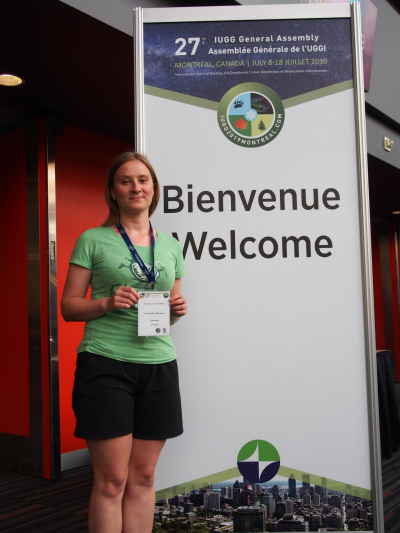- ArcTrain
- Training reports
- IUGG 2019
IUGG 2019
July 8th - 18th 2019, Montreal, Canada

Summary:
The IUGG 2019 (the International Union of Geodesy and Geophysics General Assembly) took place in the Montreal Convention Centre in July 2019. The IUGG is one of the largest conferences including a various number of oceanographic sessions. It is organized once in 4 years. The goal of the meeting is to provide the opportunity for communication between 8 largest scientific communities: the IACS, IAHS, IAG, IAPSO, IASPEI, IAVCEI, IAGA, and IAMAS. Aims of the General Assembly were to share the main results of recent geophysical researches, discuss the most important problems for today and provide the cooperation opportunities for scientists from different research fields. Sessions of the conference covered the wide range of scientific topics. The program of the conference included workshops, inviting lectures, Union lectures, award ceremonies, oral presentations, and poster sessions. One of the parts of the IUGG sessions is the IAPSO (The International Association for the Physical Sciences of the Oceans) session, which is the most interesting for oceanographers and includes a variety of subsessions.
Report:
The General Assembly activities started on Monday (08.07.2019) afternoon with the registration and finished on Wednesday (17.07.2019) evening with the Closing Ceremony. The welcome session and all other activities were organized by the Local Organising Committee, Montreal, Canada. I joined the IAPSO and the Joint Symposium IAPSO-IAMAS sessions during the conference time. I’ve made two reports at the conference. The first my presentation “Wind-induced variability of upper ocean mixing in the North Atlantic” was during the P04 session “Mixing processes in the ocean” on 10.04.2019. There, I presented my main findings of diapycnal mixing in the subpolar North Atlantic. The second presentation “NEMO Model Response to Changes in Forcings: Influence on Buoyancy, General Circulation and Vertical Fluxes in the Subpolar North Atlantic” was during the JP02 session “The North Atlantic-Arctic system: state, process, and change” on 10.04.2019. I presented my results from 47 sensitivity experiments with NEMO for short-term climate scenarios. These two sessions were the most important for me because of topics of lectures that are closely related to my PhD studies. I also attended “General topics in oceanography”, “The meridional overturning circulation”, “Western Boundary Current system”, “The Southern Ocean” on Thursday, Friday, Saturday and Sunday. Topics of presentations during these sessions were the most interesting and useful. I’ve also got a chance to work with the session “Mathematic of the Planet Earth: the Science of Data” which was not a part of oceanographic sessions, but covered variety of topics and problems (also in oceanography) deals with data, mathematical methods and statistics and deep machine learning, which seems to be the most promising direction to date. It was a very important experience for me on the last stage of my PhD studies to present the results, to get some new fresh ideas how to improve the current work, and plan a future carrier. I’d like to thank ArcTrain for the financial support of my travel.
Natalia Sukhikh


